50 million people in America experience allergies. With those kinds of statistics, chances are you or someone in your family unfortunately also suffers from allergies. Finding ways to naturally reduce allergens in your home can sometimes seem near impossible.
Creating a clean home environment is the best way to reduce and eliminate allergens that act as irritants. Dust, mold, dander, dirt, pollen and more find their way into your home every day. Removing or reducing these irritants is the best thing you can do for allergy sufferers.
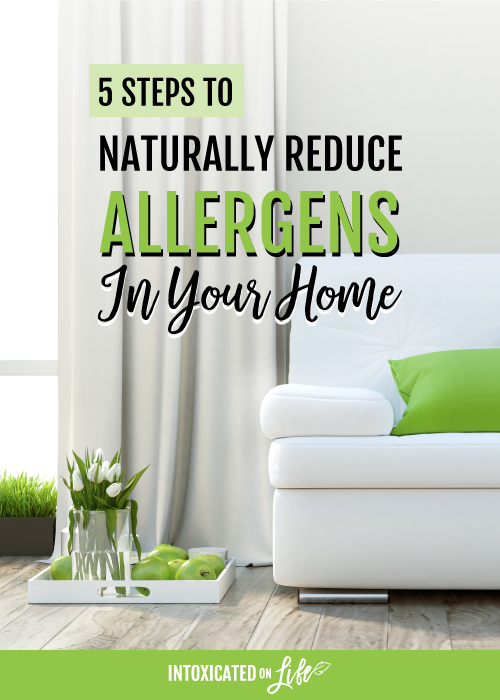
Cleaning your home from top to bottom every day is impractical. Taking small steps every day will lead to a cleaner environment and help everyone breathe a little easier. While a clean home will not eliminate allergies, it can definitely lessen allergy symptoms.
Word of Warning: be sure that those with the most severe allergies are not around on deep cleaning days. If they can’t avoid being home, encourage them to wear a face mask and spend time in a room not being cleaned in order to avoid allergy flares ups.
1. Declutter to naturally reduce allergens in your home
Decluttering and organizing your home is a great first step to reducing allergens. More surfaces in the home mean more areas for irritants to stick to. Reducing the amount of surface area for allergens to live will allow your cleaning to be more efficient and effective.
Decluttering means finding new homes for the things that live in your house or tossing it in the trash.
- Have a stack of bills and important papers on your desk? Store these in the desk drawer or filing cabinet.
- Keep small appliances and kitchen utensils on the counter? Make space in a cabinet or drawer to stow these when not in use.
Storing items when not in use not only helps prevent allergens from accumulating but allows us to be more mindful about cleaning these items as well.
If decluttering seems like a daunting task, consider making a list and breaking tasks into smaller chunks. Re-organizing an entire house is a huge job but if you start with just one room, it’s not nearly as overwhelming.
2. Reduce allergens by keeping soft surfaces clean
Soft surfaces in your home tend to hold more allergens than hard surfaces. The problem is, we tend to forget about cleaning these areas. Properly cleaning the soft surfaces in your home is a great way to naturally reduce allergens in your home.
Carpets
Carpets harbor far more allergens than hardwood, laminate, or tile flooring. Removing the carpet from your home is a great way to avoid allergens altogether!
When you clean the surface of a carpet-free floor, you’re getting rid of dirt and allergens instead of grinding them down. While area rugs are still carpet, they’re much more manageable to clean than permanently installed carpet.
If removing carpet from the home isn’t a practical option, regular vacuuming is a great alternative. Vacuuming twice weekly is a great place to start.
If you have pets, a large family, or simply a home with lots of foot traffic, daily vacuuming is recommended. Removing dander, dirt, and allergens from the carpet daily will reduce the chances of them becoming irritants.
Bedrooms
Bedrooms are especially important to keep allergen-free. Getting adequate sleep is important to our health, but we spend a lot of time surrounded by soft surfaces while in bed.
There are several steps to take to create a cleaner, more allergy-friendly space in bedrooms:
- Make bedrooms pet-free zones
- Use hypoallergenic covers for pillows and mattresses
- Change bed linens frequently. Use hot water to completely eradicate dust mites hiding inside.
Window Treatments
Another soft surface that might be overlooked is window treatments. How often do you replace your curtains? Wash them?
Remember to regularly wash your curtains (and blinds if you have them) to cut back on the number of allergens in the home.
3. Reduce pet allergens in the home
If your family has pets, consider them in this fight against allergens. Regular bathing and grooming will cut back on the amount of dander and hair shed in the home.
If possible, choose grooming services outside of the home to prevent the discarded allergens from finding a home in your home.
When bathing and grooming pets at home, remember to clean the area thoroughly afterward. Wipe down and disinfect all surfaces, vacuum carpets or rugs, and mop hardwood, tile or laminate floors.
Another way to reduce allergens from pets is to consider outside time. Allowing pets to spend time in a fenced yard will allow them to shed hair and dander outside instead of in your home (and save you time from cleaning). However, if the pets spend time outside, regular bathing is even more important to prevent outside allergens from hitching a ride in the house on fido.
4. Naturally reduce allergens in the air
The air in your home is an important player when it comes to how allergens travel. Filtering and purifying the air that flows in your home will cut down on the number of irritants you encounter each day.
A HEPA air filter and vacuum are imperative for those struggling with allergies. Even with the best cleaning practices, you still can’t eliminate the allergens in your air without a HEPA air filter. In a collaborative study between the University of Colorado and National Jewish Medical and Research Center, they found…
The use of HEPA-filter vacuums and air purifiers in homes reduced the concentration of particles less than 10 microns by almost 50 percent. (Source)
Remember to regularly change the air filter in your HVAC system. Most filter manufacturers recommend changing the filter every 30 days, but those with severe allergies might consider changing more often or purchasing allergen reducing specific filters.
Windows & Humidity
During months when pollen and other allergens are high, keep your windows closed. Utilizing air conditioning during these times will help cut down on the number of allergens you’re bringing into the home and cut down on the humidity.
Excess humidity in your home makes it easier for mold and dust mites to thrive. If your home is susceptible to humidity, consider purchasing a dehumidifier.
Dehumidifiers are a great way to reduce the moisture in your home, but don’t forget they also require regular cleaning and maintenance.
It’s a good idea to regularly check your home for cracks and damages where water leaks can enter. Excess water entering the house can lead to even more unwanted humidity and allow mold to grow.
Plants
If you keep plants in your home, consider covering the soil with gravel. Plants and soil are susceptible to mold growth, and mold is a common irritant for those with allergies.
Be sure you’re properly caring for your plants. Overwatering, lack of proper sunlight and lack of pruning are all contribute to mold growth.
If possible, move inside plants outside or place them in areas where you spend the least amount of time. While removing irritants is always the better option, reducing is second best.
5. Naturally reduce allergens with regular deep cleaning
The overall theme in this post is keeping a clean house. It’s important to remember that regular cleaning, including deep cleaning, are key components for naturally reducing allergens in your home.
Cleaning takes a lot of effort but is the first line of defense when battling allergies. If you don’t already keep a cleaning schedule, now is a great time to start one.
Make a list of all of the tasks that need to be completed in your home. Include daily tasks, weekly tasks, and tasks that might only need to be completed once a month. If you have kids, now is a great time to get them on board with age appropriate chores!
Keep in mind that some store-bought cleaners could have chemicals that trigger allergies. While purchasing hypoallergenic cleaners is an option, you can also choose to make your own safe-to-use cleaners.
We use different soaps and cleaners all over the house, so remember that cleaners aren’t the only thing to keep in mind. If you’re looking for homemade laundry detergent, you might check out our homemade lemon and lavender soap.
While following these tips can naturally reduce the allergens in your home, keep in mind they won’t remove allergies altogether. But taking small steps to naturally reduce allergens in the home every day can help lead you to a life with fewer allergy symptoms.


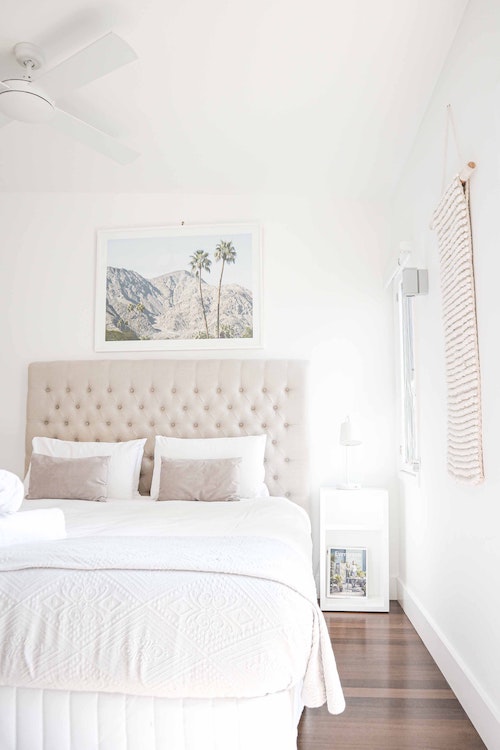

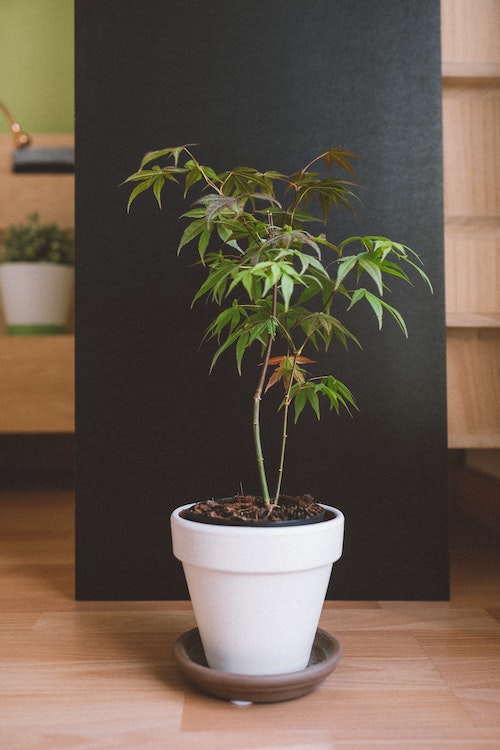
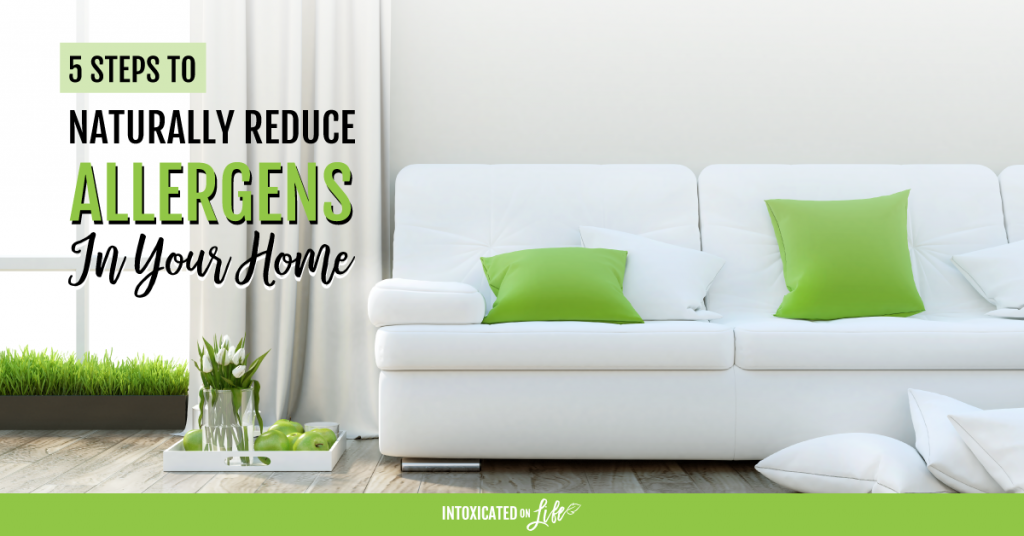



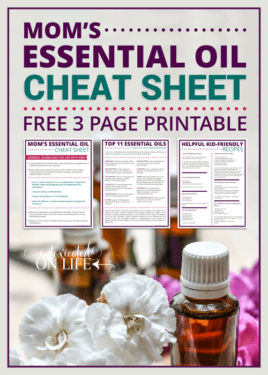





Great article 🙂
can you share how you came to decide on bamboo for your floor (when you replaced the carpet)?
These are really helpful tips! My kids are having problems with the dust lately and the doctor said that I need to make sure that I reduce the allergens at home. Usually I clean a lot, but with this problem I definitely need to do it even more often. I will try to be more consistent with the dust cleaning and will try to improve the air quality with some air purifiers! Thanks so much for sharing!
I am wondering if air purifying plants do enough (along with the deep cleaning of course)?
It probably depends on how sensitive those in your household are to allergens.